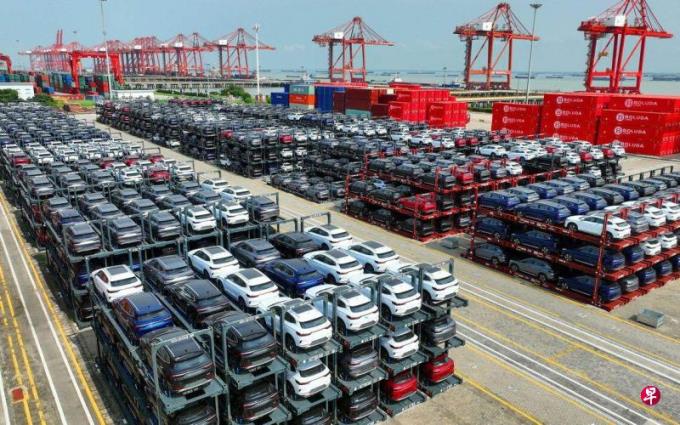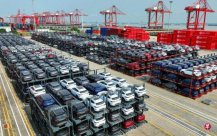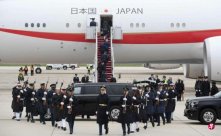
According to the view of Greek economist Warufz, the game between the United States and China has entered the so -called "science and technology feudalism" from traditional capitalism.Silicon Valley's scientific and technological giants and Chinese technology giants are in the ascendant, and the world is likely to form two camps: US dollar and RMB.
In Guizhou in March, there are flowers and spring.From Guiyang to Yongle, Pingba, Libo, Kaili, Xijiang, Jinhai Snow Mountains, Weigin and Hepingyuan, etc., rapeseed flowers, peach blossoms, azaleas, and cherry blossoms in the mountains are dizzying and amazing.
Guizhou is as large as Guangdong Province. It was originally poor provinces, and the mountains in the territory were undulating and the traffic was inconvenient.However, this short -term tourism has left a very different impression: roads and high -speed high -speed are allocated, tourist buses are between mountainous areas, mountains and rings are flat, and there are endless tunnels and viaducts along the way.It's all ways.Suddenly, the so -called "overcapacity" topic that has been internationally made up in the world has recently been associated.
A huge China, now even provinces like Guizhou have almost all there are comprehensive public transport infrastructure construction, and it is not surprising that overcapacity is overcapacity.All the built -in construction is built. What does the original construction army do?Where can I build a bridge to build roads?Where can I lay high -speed rail?The output of production capacity is inevitable.There is no job in China. Regardless of state -owned enterprises or private enterprises, they have to find opportunities abroad to try to enter the international market.So there is the "Belt and Road".This is a good thing, because many developing countries lack funds, technology and technical talents that build such huge and complex infrastructure.Our neighboring country Indonesia, isn't it the first high -speed rail connected to Jakarta and Bandung in Southeast Asia?
In the past, Western countries, Japan, South Korea and other developed economies did this.Therefore, the international market is fiercely competitive, and many public -private companies in many countries with excess capacity want to share a share.There are many sections in Singapore's subway lines to be undertaken by foreign companies.This competition also brings the benefits of cheapness and beauty to developing countries.However, when such a behemoth in China also joined the competition, the situation is very different.Because its competitiveness is too powerful.
Competition between company companies is often brought into the government and political factors.In order to strengthen competitiveness, many governments will subsidize their domestic enterprises.The competition between the Boeing of the United States and the European Airbus is a good example.Boeing originally dominated the world's civil aviation market, but in 1970, the French and West Germany governments were mainly. After the appearance of the Airbus supported by the support of the support, they gradually became a strong opponent of Boeing and fiercely competing with each other.Boeing has received high subsidies from the US government, and the French government has the equity of the air passenger cars.
Business competition has evolved into international disputes.For example, the U.S. government filed a lawsuit with the World Trade Organization in 2006 to oppose the EU's subsidies of $ 22 billion to the Airbus; the European Union also filed a counterclaim and demanded that the United States stopped providing an indirect subsidy of $ 23 billion in Boeing.The two sides have come and fight, and the lawsuit is endless.Reflecting one thing: In international relations, even if it is an alliance, it involves national interests, and immediately turns his face and does not recognize people.Now this kind of thing happens to China, which is positioned as competitors, it is no wonder that Europe and the United States will join forces to advance in China ’s“ excess capacity ”subject.
Government subsidies are normal
The government of a country supports the development of domestic enterprises, which is the norm.Excess capacity is also the normal state of capitalist production.If you have business, you rush to do it, and finally the market decides to live and death.But in this competition, which government dares to say that it has not supported or subsidized by domestic companies?Without competitors or competitions, it is included in the market. If the competition loses, it seems ridiculous when the competition loses, but it is also normal.
Recently, US Finance Minister Yellen visited China and demanded that China must control the "new three" exports, namely new energy vehicles, lithium batteries and photovoltaic products.The sales of these products are currently the world's first, and it has become a new engine that promotes the growth of GDP.But these are also projects for Western countries.The West can't catch up. It just wants China to slow down and try to restrict obstruction, including prohibiting high -end chips (chips) to China.
There is a theory of comparative Advantage in the free market competition.The new three products in China are green products that use clean energy, which helps to save energy and reduce carbon reduction, meet the needs of climate change, and it is also what the world needs.General consumers are good things.Such a comparative advantage should be popular.However, Yellen's statement is that China is due to government subsidies. If a large number of dumping worlds, it will threaten the survival of similar industries in other countries and cannot be accepted.As a result, the United States has also vigorously subsidized the country's industries. It is necessary to establish its own supply chain and break off chain with China.
Yellen is an economist, and it is impossible to understand the truth of comparative advantages.Therefore, Bloomberg's commentator David Ficcin couldn't help criticizing that Yellen was one of the most basic principles in economics in 200 years: comparative advantage.To put it blunt, this is protectiveism.Ficklin believes that this will be a protectiveist disaster that hinders the world to fight for zero emissions.
Isn't the United States a country that once strongly advocated globalization?Why is it now against globalization and sacrificing the flag of protectionism?The answer is actually in comparative advantages.In the past, Western countries have been leading leaders in science and technology products, and they have always held the world's cow ear, which has long occupied a comparative advantage for a long time.Unexpectedly, after decades of inspiration for the Chinese, the Chinese later lived in some areas, and they were invincible in the world market. Of course, it is difficult for Western countries to suffer.For decades, I have been standing down, but today I have to move on the soil on the Tai Sui.
In international relations, the rules are generally determined by the strong.The strong country will never determine the rules that are not good for themselves, but the rules are dead after all. When the objective situation changes, the power of the strong country will try to change and violate the rules.This is what Xiu Xidid said: the strong is doing whatever he wants, and the disadvantaged can only swallow.
China has spent decades that have been in the same time, and have decided to look at the West.This is one of the biggest changes in international relations today.Technology giants such as Huawei have been blocked, and now the short video platform Tiktok seems to be more fierce.China is helpless, but it will never give up the dream of a strong country.Therefore, we must expect that competition and severe games in great powers will continue.
According to the views of the economic scholar of Greece's Treasury Secretary in 2015, the game between the United States and China has now entered from traditional capitalism. The so -called "technical feudalism".This mainly refers to the technology and e -commerce giants in the platform economy, with cloud capital, which has replaced the traditional market to a certain extent and is the emerging feudal landlord class.Silicon Valley's scientific and technological giants and Chinese technology giants are in the ascendant, and the world is likely to form two camps: US dollar and RMB.
In short, the so -called dispute over the overcapacity is actually a dispute between a big country and a dispute between the great power and the emerging power. Technology has become the most miserable field in the battle, although there is no smoke.The question is, how long can the rules -based international trade system be maintained?
The author is a former journalist, a former member of the Congress




